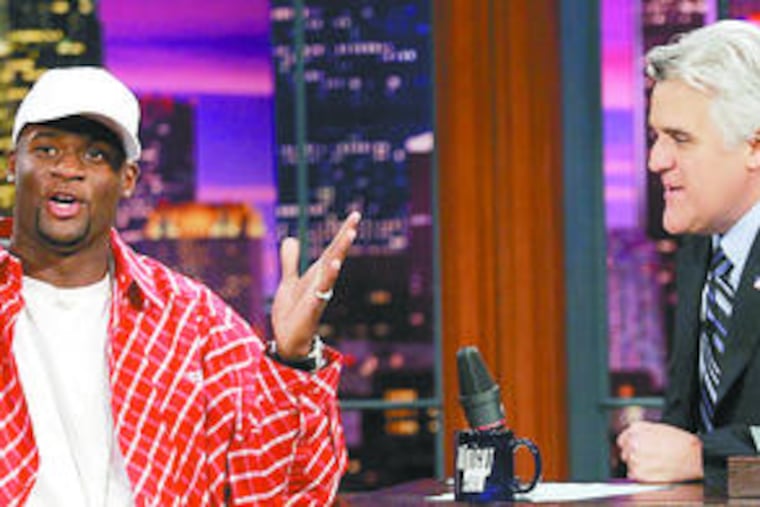Leno to yuk it up at 10 in a 'game-changer'
NBC dropping the drama hour for five nights of comedy/talk.

NBC officially announced yesterday that Jay Leno will be hosting a comedy/talk show five nights a week at 10 p.m. beginning next fall.
Is this a sharp programming strategy or a further step into mediocrity for NBC, mired in last place among the four major networks?
Leno, host of
The Tonight
Show
since 1992, is scheduled to leave that post at the end of May, to be replaced by Conan O'Brien. Since that transition was first announced in 2004, NBC has been seeking an appropriate vehicle to keep the comedian in its lineup.
But the solution - a comedy show at 10, an hour traditionally reserved for broadcast's most sophisticated dramas - sent shock waves through the industry.
"It's not just a schedule shift," said John Rash, the director of media analysis at the Campbell Mithun advertising agency. "It's a potential game-changer in multiple-day parts and at multiple networks."
The Jay Leno Show
is a concession to the diminished fortunes of the networks as audiences bail and cable dramas continue to gain more attention and acclaim.
"As broadcast television continues to change, success demands a new paradigm," Jeff Zucker, president and chief executive officer of NBC Universal said in a news release yesterday. "For the past few years, we've been very vocal about two things: transforming broadcast television for today's media landscape and keeping Jay at NBC."
NBC has been more focused on reducing costs than on creating quality entertainment programming of late. Leno's new show is projected to save the network $150 million to $200 million a year by replacing dramas, which are far more expensive to produce.
"It follows the same script that NBC has been writing for the last year," said Brad Adgate, senior vice president of research at Horizon Media in New York. "Reducing production costs by not ordering pilots, putting on more reality shows, and partnering with advertisers for branded entertainment and product placement."
Moving Leno to prime time is NBC's most radical experiment yet, especially since the network has had disappointing results with similar attempts of late, especially Rosie O'Donnell's live variety show last month that attracted only five million viewers despite heavy promotion.
"Right now NBC is in full retreat mode," said an industry insider. "Scripted programming is not working. They're retreating to their comfort zone: morning and late-night programming."
Leno jokingly acknowledged that observation at a news conference in Hollywood yesterday. "The show starts at 10," he said. "I'll be on after the last hour of the
Today
show."
NBC isn't sacrificing much by turning over the slot to the lantern-jawed comedian. Its 10 p.m. drama stable includes the lame-duck
ER
, the already canceled
My Own Worst Enemy
, and two
Law & Order
series that could easily be shifted to 9.
So the bar isn't set very high for
The Jay Leno Show
. "NBC can accept lower ratings at 10 p.m. due to the lower cost," Rash said. "But based on the current schedule, Leno has the opportunity to at least meet the average that NBC currently delivers."
"I originally wasn't going to stay at NBC," Leno said. "Then I remembered something my parents always told me: 'Whatever I do in life, make sure I come in fourth.' "
He maintained that people continually tell him that
Tonight
comes on too late for them to watch. "With the economic situation," he said, "a lot of people go to bed earlier, wake up earlier."
The new show, he said, will be taped about three hours before airtime. It will start with a monologue but put more emphasis on topical humor and out-of-studio stunts than
The Tonight Show
does.
At this point, the other networks are unlikely to follow NBC's lead.
"You don't change what is already succeeding," said CBS spokesman Chris Ender. "Our prime time is performing quite well."
Of course, if Leno carves out big numbers, he won't have the playing field to himself for long.
"Like everything else in television," Adgate says, "if it's successful, we'll see imitations."
.